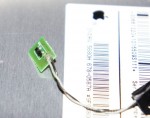My late-2009 27″ Intel iMac now has an eSATA port. I’m documenting how I did it here mainly for posterity. Although it works fine, I cannot recommend that others attempt to perform the same surgery on their own crazy-expensive Apple computers. eSATA mods like this won’t be satisfying to most users, and the operation is risky and destructive enough that non-crazy people shouldn’t attempt it!
Apple
Explore 9/11 – An iPhone App of Remembrance
Nine years ago tomorrow, a group of terrorists attacked the United States. Next year, a memorial will rise in New York. Last year, I met the staff of the National September 11 Memorial & Museum and was struck by the professionalism and respect of this group, all struggling to build a fitting memorial. An iPhone app to explore 9/11 might seem odd, but as you will see it makes perfect sense.
iTunes 10 Breaks Non-Apple Streaming (Again)
Do you use an “iTunes compatible” device like an Iomega ix4 or Drobo FS or Roku SoundBridge? Have you noticed that it no longer works since you updated to iTunes 10? That’s because Apple made a simple change to their Digital Audio Access Protocol (DAAP) that causes third-party devices to fail to connect correctly. Although software patches are already appearing, there is no guarantee that older devices like that Roku will ever be updated.
ExpressCard SATA Adapters: The Lesser of Two Evils
While considering the possibilities of adding an eSATA port to my iMac, I am also investigating eSATA solutions for my MacBook Pro. Since I have an ExpressCard slot, the logical choice is to pick up one of the many ExpressCard eSATA adapters. But it looks like the options aren’t all that great: The SiliconImage chipset used in many is full-featured, but the drivers and hardware implementations are buggy, while the older JMicron controller is cheap and simple but lacks many desirable features.
ExpressCard: A Sure Thing That Failed
PCMCIA and CardBus slots were universal and popular a decade ago, but the advent of PCI Express meant reengineering the old standby. The result was ExpressCard, a never-popular compromise that mixes PCI Express and USB into a confusing and little-used mashup. With few modern laptops including an ExpressCard slot and fewer users, a fair question to ask is “where did it all go wrong?”




